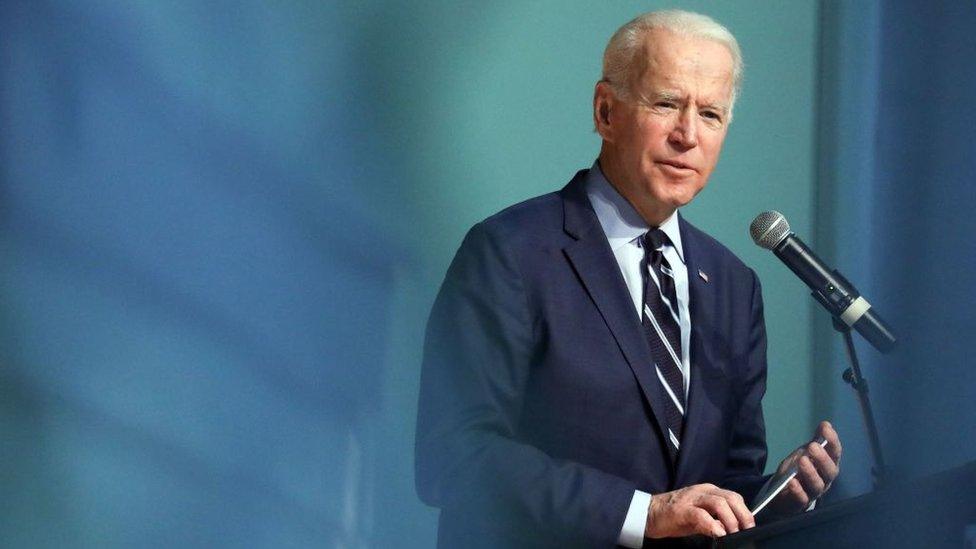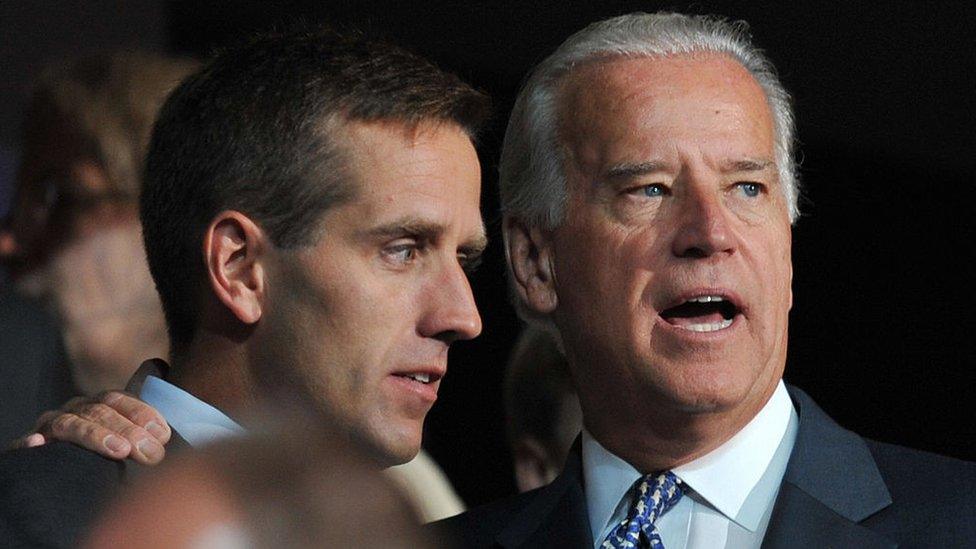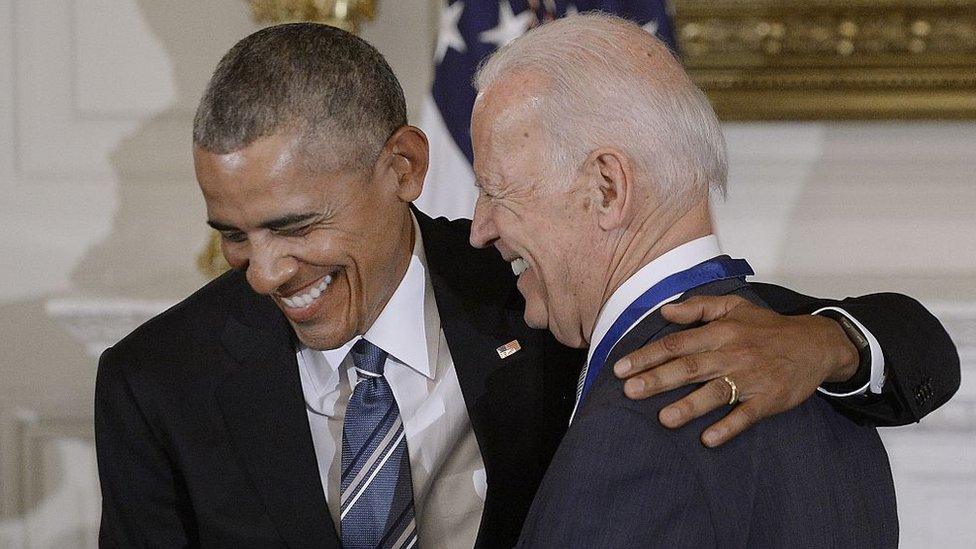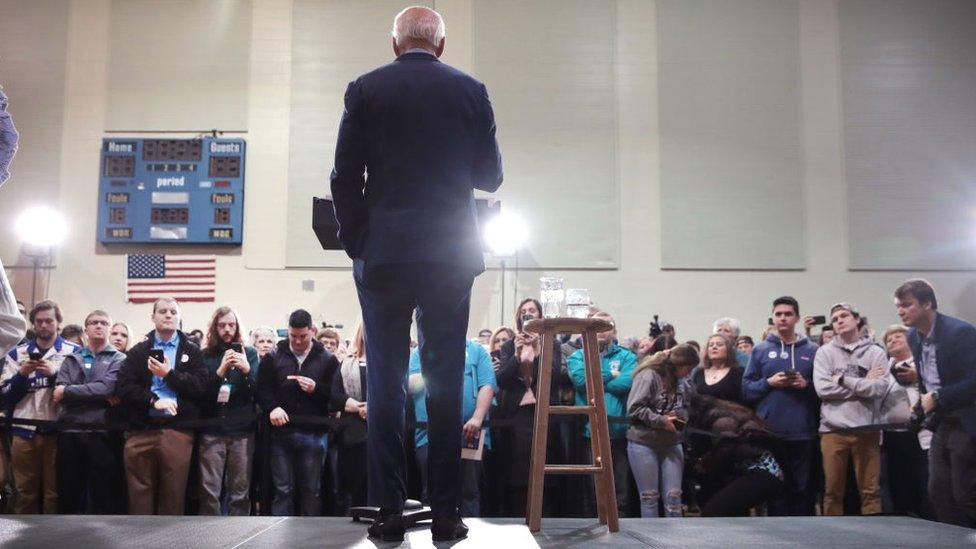Joe Biden: His rise to the top in a life dogged by tragedy
- Published

Democratic President Joe Biden will win a second term in the White House if he can overcome Republican Donald Trump one more time. But his rise to the highest office came despite a series of tragedies in his personal life.
The 81-year-old had been in politics for decades before he finally got his chance to do the top job after a bitter election campaign ended in victory in 2020.
As he runs again he will point to a roaring US economy which has bounced back well from the pandemic, his mobilising of a coalition to help Ukraine after Russia's invasion and a number of legislative wins.
But voters have concerns about his age, rocketing bills for groceries and a crisis on the southern border. Polls suggest he is locked in a dead heat in his race against Mr Trump.
Many of the issues Mr Biden has championed as president - reinvigorating US industry, lowering healthcare costs, addressing inequality - are lifelong causes dear to him.
And the adversity he has faced on that journey to the top has shaped the man now imploring voters to give him a second term.
Losing loved ones
The eldest child in a working-class, Irish-American family, the young Joseph Robinette Biden Jr used his prowess at sport as a way to distract attention from his stutter.
His family had moved from industrial Scranton in Pennsylvania to Wilmington, Delaware, when he was 10 and he prospered in his new surroundings.
While at college, a job as a lifeguard at a public swimming school opened his eyes to the racism endured by black Americans, he later recalled.
He went to law school and became a public defender with mostly African American clients before going into politics.
But in 1972, shortly after he won his first Senate race, he lost his first wife, Neilia, and baby daughter, Naomi, in a car accident.
He famously took the oath of office for his first Senate term from the hospital room of his toddler sons Beau and Hunter, who both survived the accident.
In his memoir, he describes the pain he felt the day of the crash as rendering him speechless.
"I could not speak, only felt this hollow core grow in my chest, like I was going to be sucked inside a black hole," he wrote.
In 2015, Beau died of brain cancer at the age of 46. The younger Biden was seen as a rising star of US politics and had intended to run for Delaware state governor in 2016.

Joe Biden lost his son Beau (left) in 2015
Mr Biden garnered considerable goodwill following Beau's death, which served to highlight one of Mr Biden's central strengths - a reputation as a kind and relatable family man.
This perceived warmth is not without its pitfalls. After entering the 2020 race, he faced accusations of unwelcome physical contact during interactions with female voters - complete with uncomfortable accompanying footage.
The avuncular politician responded by saying he was an empathetic person, though he accepted standards had changed. The episode, however, stoked a perception for some that he was out of touch.
He has stuck doggedly by his son Hunter who has made headlines for his drug addiction and his business interests, which Republicans say presented his father with a conflict of interest when he was vice-president.
A political fixture
The six-term senator ran for president in 1988 but withdrew after he admitted to plagiarising a speech by the then-leader of the British Labour Party, Neil Kinnock.
His lengthy tenure in the nation's capital has given critics ample material for attacks.
Early in his career, he sided with southern segregationists in opposing court-ordered school bussing to racially integrate public schools.
A look back at Joe Biden's life and political career
And, as chair of the Senate Judiciary Committee in 1991, he oversaw Clarence Thomas's Supreme Court confirmation hearings and has been sharply criticised for his handling of Anita Hill's allegations that she was sexually harassed by the nominee.
Mr Biden was also a fierce advocate of a 1994 anti-crime bill that many on the left now say encouraged lengthy sentences and mass incarceration.
He ran for the Democratic 2008 nomination before dropping out and joining the Barack Obama ticket.
By Obama's side
As a long-time Washington insider, Mr Biden had solid foreign affairs credentials, and helped balance Mr Obama's comparative lack of executive experience.
The so-called "Middle Class Joe" was also brought on board to help woo the blue-collar white voters who had proved a difficult group for Mr Obama to win over.
His eight years in the Obama White House - where he frequently appeared at the president's side - has allowed Mr Biden to lay claim to much of Mr Obama's legacy, including passage of the Affordable Care Act which extended affordable healthcare cover to millions of poor Americans.

He made headlines in 2012 by saying he was "absolutely comfortable" with same-sex marriage, despite the president having not yet given support for the policy.
Mr Obama ultimately did so, just days after Mr Biden.
A challenging first term
A few years later, Mr Biden was campaigning again for the top job, promising what he described as a return to normalcy after the Trump years and a pledge to get the country through the pandemic. His return to the White House was largely propelled by the support of women, minorities and young people.
Just two weeks before his inauguration, supporters of former President Donald Trump stormed Congress in a bid to thwart the certification of Mr Biden's election victory.
His new campaign will focus heavily on the fight against the ideology on display during the January 6 riot. The video announcing his re-election bid opened with images of violence from that day.
"Every generation of Americans has faced a moment when they've had to defend democracy," he said. "This is ours. Let's finish the job."

Mr Biden will point to a number of accomplishments during his tenure, including job creation, stimulating an economy rocked by the pandemic and "once-in-a-generation" investment in key areas of American life.
A succession of bills he signed into law channelled trillions of dollars into improving the country's ailing infrastructure, addressing the challenge of climate change, lowering the cost of prescription drugs and wrestling supremacy for the production of computer chips away from China.
But he will face tough questions on his handling of immigration, especially at the US-Mexico border, his unwavering support for Israel as a humanitarian disaster unfolds in Gaza, and his advancing age.
It would be unwise to write him off, however worrying he might find the polling.
He often refers to his father teaching him that the measure of a man is not how many knocks he receives but how quickly he gets up off the floor after each one.

More on the US election
Explained: A simple guide to the US 2024 election
Analysis: Four things that could decide who wins
Recap: The Trump life story to date
